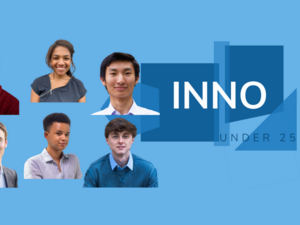
Fifteen bright and promising startups recently presented at the Breakthrough Lab (B-Lab) Venture Showcase hosted by Brown University’s Jonathan M. Nelson Center for Entrepreneurship.
B-Lab is a rigorous, eight-week accelerator program that supports student entrepreneurs by providing access to high-level, sector-specific mentoring, business and technical support, focused programming and dedicated space. During the program, student entrepreneurs work on things like customer discovery, prototyping, learning from mentors and trying to figure out how to form and launch their ventures.
“It’s a selective process to get into B-Lab,” said Jason Harry, B-Lab's director. “We look for ventures that we consider to have impact at scale. That means as they grow and are successful, they will really be something meaningful in the world and have a big impact.”
Because of the coronavirus pandemic, B-Lab held its showcase on Thursday over Zoom, featuring short presentations, lots of live interaction from the audience and breakout rooms at the end so members of the audience could ask questions directly to the founders of companies that caught their eye.
Here is a list of the companies that presented:
Aridity Capital: Founder Eddie Uong’s venture Aridity Capital seeks to address inequality in the stock market. Uong described Aridity Capital as “a financial service organization making markets work for low-income investors by creating a fund for low-income investors.” He plans to set up the fund as a nonprofit and remove the risk for low-income investors by guaranteeing their principal investment.
BitterSweet: Founder Hillary Brame has launched a company that makes end-of-life care products for pets “to ensure the transition from life to death is dignified and meaningful for the animal and the human.” Bittersweet’s main product is a pet exam table that converts into a shroud so after the pet has died, the veterinarian and owner can cover the animal, creating a more symbolic process after the death. There are 135 million cats and dogs in the U.S., 14 million of which die every year.
EmpowerU: EmpowerU is an edtech startup that provides students with the resources and tools they need to have a better chance of obtaining higher education. According to College Board, only 57 percent of people in Rhode Island between the ages of 18 to 24 are enrolled in college. Part of the reason for this is the lack of resources available to high school students. Founder Elvia Perez said one in five students do not have access to a guidance counselor at their school. EmpowerU will address issues like this by allowing students to share their stories with one another to inspire, build a community where students can connect with each other and provide resources to students based on their interests.
Figured: On average, people with afro-textured hair spend two years searching for hair care products that work for them and spend almost double the amount on products than people with straight hair do. Founder Lauren Brown hopes to fix this solution with her company Figured, which uses a three-step process to help people with afro-textured hair find the products best suited for their specific needs. First, users take a mobile quiz to build a hair profile, providing 40 pieces of data. Then, hair care experts analyze each user and provide personalized care and product advice. Finally, a product recommendation engine helps the user find the best products for them.
InStance: There are more than 8 million adults in the U.S. with mobile disabilities that include serious difficulty walking or climbing the stairs. InStance co-founder Joshua Daniel said he wants to bring the power of group exercise to this community with exercise-based experiences for people of all abilities. InStance is developing a community app with a subscription revenue structure that will offer live and on-demand classes as well as a community to share data with.
LapSnap: Many wheelchair users cite grocery shopping as one of the hardest things for them to complete. LapSnap co-founders Diana Perkins, Chloe Rosenberg and Hannah Mintz plan to address this problem with their product, a shopping basket designed for and with wheelchair users. The bag allows users to carry items hands-free with an attachment that is body-based, meaning they can use it in a number of ways including behind their back, under their back or through the arm of their wheelchair. The bag can also be used for a variety of other activities around the house, including laundry and gardening.
Monara: Monara is a startup that supports girls as they transition through puberty. Founder Jessica Zhu says there are 20 million girls going through puberty right now, and 55 percent of American women feel they were unprepared for the first time they got their period. Monara will offer products, services, education and community to help children going through puberty cope with the changes. The first product Monara plans to offer is a guided journal that focuses on health and wellness topics and will include medical content, interactive features and other activities. Ultimately, Monara wants to create a customizable box that supports pubertal growth and become the most trusted e-commerce site fo pre-teen and teenage kids’ health and wellbeing needs.
Pointz: Pointz has developed a GPS mapping app that uses real-time car traffic data and crowdsourced safety data from locals to create the best route for micromobility for travelers such as bikers. Co-founder Maggie Bachenberg described the company as the Waze for bikers, scooters and other micromobility vehicles. Bachenberg said the team’s plan to make money is to sell the data they generate to cities and other mapping companies.
Survivor Central: Survivor Central is a mobile app for survivors of sexual assault to help them report their incidents and access assistance quicker. Founder Reetam Ganguli said the platform uses a very simple and intuitive question form, sort of like TurboTax, to answer questions from sexual assault survivors. Based on their responses, the survivors are paired with regional grants and resources they qualify for, including medical and financial aid, child support, psychological resources, information about restraining orders and legal aid. The platform automates the need to sift through hundreds of resources. Survivor Central is highly confidential and encrypts all data.
SiliStor: The current process for storing breast milk is quite complex, with most parents first double-bagging the milk, then pumping it into a bottle, transplanting the milk into storage, then putting it back into the bottle to feed a baby. SiliStor co-founders Dana Biechele-Speziale and Selahaddin Gumus believe they have come up with a better way. Their breast milk storage system allows for simple pumping, storing and feeding of breastmilk and requires no milk transfers. The rectangular device maximizes storage space, and the silicone material does not emit harsh chemicals.
WeFlop: Co-founder Glenn Yu wants to remove the traditional barriers that stop people from playing online poker, which include a lack of knowledge of the game and not wanting to lose the money to more experienced players. His platform, WeFlop, would be a poker platform where people can “host and customize their own poker rooms" and ultimately create their own online poker communities.
Ubica: The process of putting together an event can be very tedious and complicated, frustrating people from younger, tech-savvy generations. Ubica co-founders Samuel Aguilar and Nkanyiso Nzimande are simplifying the process with an online forum that allows people to create and share events quickly. The Ubica platform offers centralized ticketing, analytics and other features. The app even allows organizers to begin planning events on the app and then publishing to different communities. The platform could launch as soon as October.
Belong Here: When immigrants come to America, they face many problems, including language barriers, lack of career resources and difficulty forming social connections. Belong Here is an online space where immigrants who have been in the U.S. for less than 10 years are matched with a first -or second-generation immigrant who serves as a mentor. Matches will be made based on background, native language, demonstrated points of need, career field and shared interests. Mentors and mentees will have weekly meetings about things like finding a job, pursuing higher education and finding a driver license, as well as practicing English and discussing American culture. The founders are William Yang, Hannah Dunnigan and Michelle Liu.
Cress Health: Founders Justin Kim and Michael Lai created an app that health care professionals can use for confidential and convenient mental health support, in an effort to destigmatize and democratize mental wellness care. The inspiration for the idea came right when the coronavirus pandemic hit. The company connects health care workers together through anonymous confidential group chats and offers mental wellness journaling.
Peal: The U.S. is currently going through a mental health crisis, with levels of depression doubling among adults during the coronavirus pandemic. Peal founders Asha Franci and Srishti Lulla want to attack this problem with an app that matches people with therapist-verified exercises and activities they can do every day.
Bram Berkowitz is a contributing writer for Rhode Island Inno.





